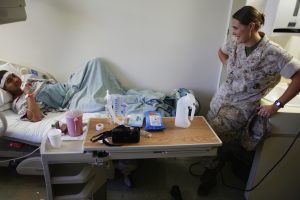Jill Leyden is the Customer Experience Administrator for Trademarks and has worked at the USPTO since July 2015. She is also a U.S. Marine who left active duty in 2013 after eight years of service. Jill has achieved the rank of Major and continues to serve as a Reservist assigned to the Office of USMC Communication at the Pentagon as a Communication Strategy and Operations Officer.

Joining the Corps
Originally from Easton, Maryland, Jill grew up visiting the U.S. Naval Academy at Annapolis, Maryland where she admired the commitment and discipline of the midshipmen. She intended to become a Navy officer after earning a scholarship to the North Carolina State University’s Naval Reserve Officers Training Corps (ROTC). That is, until she encountered Marines.
“In the morning at PT, our entire ROTC battalion would form up,” she recalled. “Before the battalion started whatever the workout of the day was, the only company of Marines was dismissed from the group, took a right face, and ran into the darkness. We never knew exactly where they went, or what they did, but they would come back for final formation, faces red, covered in sweat, looking absolutely beat. I wanted to be one of them.”
“There were very few midshipmen (newbies) like me in the company, and certainly no women,” she remembered. I thought I’d never be able to make it. One day, some of the Marines wanted me to join them for a training session because they thought I had potential. I felt honored, but sick on the inside because they thought I was tougher than I actually was.”
Her training with the Marines gave her the confidence to attempt what seemed impossible. “We literally ran around campus with telephone poles and sandbags.” At that point, she wanted to earn the title “Marine.” “I felt part of a team,” she said, “and I am friends with those same Marines to this day. I owe them big for guiding me to one of the best decisions I ever made.”
Serving Others
Jill knew from a young age that she wanted to challenge herself and serve in some way. “I wasn’t sure what that service would be right away, but I knew that helping others always seemed to provide a driving force in my life. It gave me more gratification than any personal accomplishment could.”
When asked why she joined the service, Jill will tell you that her family’s commitment to service guided her, “My grandfather, uncles and older cousins were volunteer firefighters. My grandmother and aunt were nurses. Both of my grandfathers served in the military during wartime, World War II and the Korean War. Both of my parents are the kind of people who never walked by someone in need without helping. I spent time with my mom as she volunteered for Meals on Wheels. My dad is the kind of man you’d see stopping at the scene of a car accident. My parents always taught me to use any gifts God gave me to help others. Through this I developed a strong sense of empathy for others, which I would later find to be instrumental in my own leadership development.”
Leading Marines and Appreciating Life
According to Jill, her greatest honor by far was the opportunity to lead Marines. Other fond memories include her last assignment to the USMC Wounded Warrior Regiment, which is the unit responsible for the non-medical care of seriously wounded, ill or injured Marines. She got close to Marines and their families while they were recovering. “I saw our combat-wounded Marines coming in from the battlefield to Walter Reed/Bethesda. I had the honor of watching many of these Marines recover to a new normal, and their families display a resiliency I had not before witnessed,” she stated. “All this to say, I live for them. I think about all of the life I have been able to live that some didn’t get a chance to. You have to grab life and joy when you can.”
Jill’s time in the service has had a profound impact on her life. “During my years in service I saw countless young lives cut short, starting during my deployment to Fallujah, Iraq,” she stated. “In total over the years, I’ve lost five colleagues in war.”
Developing Valuable Skills
Jill credits her military service with helping her see her current job from multiple perspectives. “I look to learn and understand people and processes first, which helps me make realistic plans that can be effectively implemented. If I take the approach of how to help others, whether it’s our talented staff, or committed customers, I find it makes for a better solution.”
Most of all, she feels that it helped develop her leadership skills. “I feel that the most effective leaders are servant leaders. If I am not investing in those who serve under my command, and those who serve alongside me, I am failing. Being a good manager and keeping projects moving is one thing, but inspiring and leading others to be the best versions of themselves is another.”
So if you meet Jill Leyden around campus, feel free to tell her “Hi and Semper Fi!”
